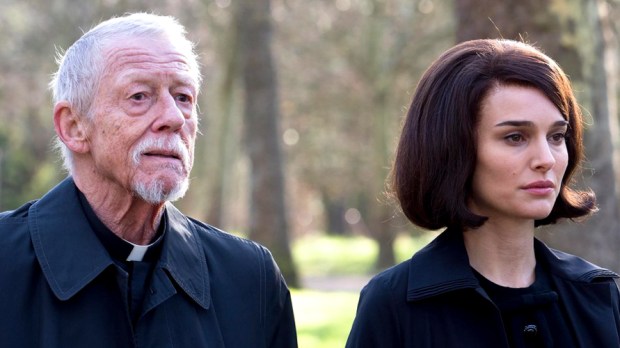Lenten Campaign 2025
This content is free of charge, as are all our articles.
Support us with a donation that is tax-deductible and enable us to continue to reach millions of readers.
Somehow I managed to miss the film Jackie during the Christmas season, but I watched it, twice, on recent long flights to and from the east coast. Like many others, I was struck by its moody, more “European” style, the high quality of the acting, especially on the part of Natalie Portman, and its historical verisimilitude, but what particularly impressed (and surprised) me were the scenes between Mrs. Kennedy and a sympathetic priest. The man of God was played by the great character actor John Hurt, who first burst on the scene as the nefarious Richard Rich in Man For All Seasons (“…but for Wales?”) and who died just weeks after filming these scenes in Jackie. Anyone interested in the art of pastoral counseling, in the problem of reconciling belief in God with great suffering, and in the human search for meaning will find the exchanges between Jackie and the priest fascinating.
As everyone on planet Earth knows, Jacqueline Kennedy was thrown, on November 22, 1963, into a maelstrom. Not only did her young husband die; he was murdered—and murdered in her presence, within inches of her face, so that she was literally showered in his blood and brain matter. Subsequently she had to explain this appalling tragedy to two very small children who had just lost their father, and she had to grieve in the most public way possible. Accordingly, she became a sort of 20th-century icon of innocent suffering. During the days immediately following the assassination, she was, understandably enough, bewildered, angry, and deeply sad, even to the point of asking God to take her life. Seeing the pain Jackie was enduring, her brother-in-law, Bobby Kennedy, recommended that she speak to a priest—and thus we have these simple and wonderful conversations between the widowed first lady and John Hurt’s clergyman.
In the course of their first exchange, Jackie tells the priest that she thinks God is cruel, to which her interlocutor says, “Now you’re getting into trouble. God is love. And God is everywhere.” “Was he in the bullet that killed Jack?” she retorts angrily. The priest calmly and correctly responds, “Absolutely.” She goes on, “Is he inside me right now,” and he says, “Yes, of course he is.” Her anger brimming over, Jackie retorts, “Then it’s a funny game he plays, hiding all the time,” and the priest patiently explains, “The fact that we don’t understand him isn’t funny at all.” John Hurt’s character is handling himself very deftly here indeed. He is carefully navigating between the shoals of denying that God is really involved with the world and affirming that the ways of God’s providence are clear to us. He is quietly insisting that though we don’t know precisely how God’s purposes are being worked out, we do know that he is intimately present to us—and that all of this is taking place under the aegis of the divine love.
My favorite scene with Jackie and the priest is the last one they share. She laments that she should have married “a lazy, ordinary, ugly man.” Considering the depth of her suffering, the priest says, “Let me tell you a parable.” He then unfolds the story of Jesus’ healing of the man born blind, recounted in the Gospel of John. The disciples of the Lord, he tells her, wondered whose sin had caused the man’s blindness, his own or his parents. “Neither,” Jesus answered. “Rather, he was made blind that the works of God might be revealed in him.” Then, gazing intently at the former First Lady, the priest says, “Right now, you are blind. Not because you’ve sinned, but because you’ve been chosen—that the works of God might be revealed in you.”
Once again, a delicate pastoral and theological balance has been struck. It is all too easy either to deny altogether that God has anything to do with our pain or to provide pat answers according to a kind of law of karma. The far subtler (and correct) approach is to affirm that God is the Lord of his creation, that he is indeed involved in our suffering, but that his purpose is always to draw some good out of evil. God is accomplishing a “work” in us, though the nature and exact trajectory of that work remain obscure to us. And how wonderful that the priest insisted that Jackie had been “chosen” to be the vehicle of this divine purpose. Choice or election is one of the master themes of the Bible. All the great heroes of the scriptural narrative—Abraham, Jacob, Joseph, Moses, Joshua, Samuel, David, Solomon, Isaiah, Jeremiah, Peter, and Paul—are elected for a special mission, and every single one of them suffered on account of that mission. God “worked” through them, and that working was painful—without exception.
A pat, easy answer? Hardly. But it is one that both honors God and provides something like real hope to a suffering soul. To any priest, minister, or seminarian wondering how to handle these famously thorny pastoral situations, I might suggest that you could do worse than to watch the moody conversations between John Hurt and Natalie Portman in Jackie.

